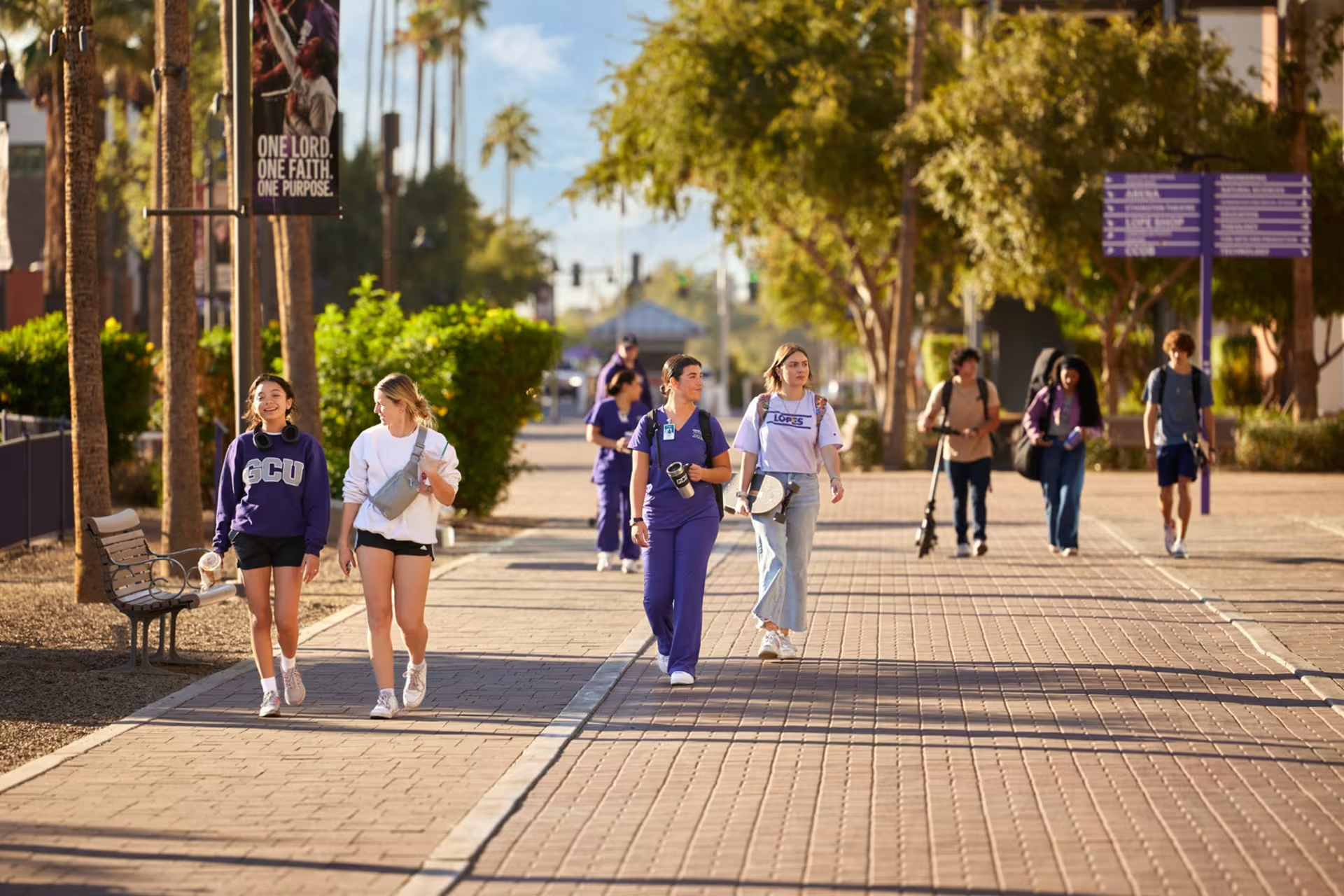GCU Sexual Misconduct Policy

Title IX and Non-Discrimination Policy
Explore Grand Canyon University's commitment to fostering a safe and welcoming environment through our Title IX and Non-Discrimination Policy, including procedures for resolving sexual misconduct and discrimination concerns. If you have any questions related to Title IX and our policies, contact the Title IX coordinator at TitleIX@gcu.edu or 602-639-5900.
Non-Retaliation
Confidentiality
Student Rights
Report a Concern
Response Resources
Victims of sexual misconduct (including sexual violence) have many services available to them so that they can obtain information and support. If you have experienced any type of sexual misconduct, know that we are here to help. There are a number of resources at GCU to assist you with your health and safety.
After a sexual assault, vital evidence may remain on your body or clothes. It is important to not shower, bathe, wash, change clothes, comb hair, eat or drink before a physical exam, if possible. See “Seeking Medical Assistance” for information on where to go for an exam, typically within 120 hours of an assault.
Such physical evidence is important to a GCU investigation as well as a police investigation. Even if you showered or washed, evidence may still be collectible and medical conditions can be treated, even after 120 hours.
Electronic evidence can be extremely important to the outcome of an investigation. Save and/or screenshot any relevant text messages, social media posts, photos, Snapchats, voicemails or emails. These can be provided to Public Safety or the Title IX investigator for use in a university investigation.
Seeking Medical Assistance
Seeking medical assistance in a timely manner is important in order to treat any possible injuries. In addition to receiving medical attention, you may wish to have a sexual assault forensic exam completed for evidentiary purposes in criminal or civil procedures.
For immediate medical attention, contact 911 or go to a local hospital emergency room.
Care/Exam Locations
Crisis Hotlines
Continuing Support
Campus Health
The Campus Health clinic can assist with basic medical needs but cannot perform sexual assault forensic exams. Anything reported to GCU’s Campus Health clinic can be done in complete confidence. Call 855-GCU-LOPE for an appointment.
Reporting an Incident
You have multiple options when reporting sexual misconduct. You can choose to pursue all, some or none of these options. While you are not required to file the report immediately after the assault, it is important to preserve any evidence. If you report the issue to GCU, we are obligated by law to investigate and respond, even if you also file a criminal complaint.
This complaint process is governed by the Title IX and Non-Discrimination Policy. The standard of proof is “a preponderance of the evidence” or “more likely than not,” and GCU can institute penalties ranging from a formal warning to expulsion. For more information, review the Title IX and Non-Discrimination Policy.
Criminal Complaint
Anonymous Complaint
University Complaint
For Confidential Assistance

Title IX and Non-Discrimination Resolution Procedures
GCU thoroughly investigates sexual harassment and sexual violence complaints, regardless of if the incident occurred on or off campus. In most cases, GCU provides multiple options for investigation and resolution of complaints based on how the complainant wishes to proceed. Investigations are required to utilize the preponderance of evidence standard (“more likely than not”).
Providing specific information on how investigations are conducted is found in the Title IX and Non-Discrimination Policy.
GCU is committed to:
Title IX
Title IX Investigation
Title IX Hearing
Title IX Sanctioning
Informal Resolution
Non-Discrimination Resolution Process
Applies to complaints pertaining to allegations of harassment or discrimination based on protected class status, involving students, staff, faculty members or third-parties, that are not eligible for resolution under the Title IX Hearing Process.
Investigation:
Finding/Sanctioning
Informal Resolution
Reporting/Investigating
Support and Assistance
If you have been a victim of sexual misconduct (including sexual violence), you have many services available to you so that you can obtain information and support.
Campus Resources
Interim Measures
Community Resources
Risk Reduction and Bystander Intervention Tips
If you find yourself in the position of being the initiator of sexual behavior, you owe sexual respect to your potential partner. These suggestions may help you to reduce your risk for being accused of sexual misconduct, which can impact your ability to continue in school, or result in a criminal record:
How To Help as a Bystander
How To Keep Yourself Safe
Orders of Protection
Orders of Protection are civil court orders that prohibit a specific person from making contact with you or even coming near you. They are issued by a judge and must be served by authorized personnel only. Orders of Protection are valid for 12 months from the date on which they are served. They are designed to keep a person from committing acts of violence and/or harassment. If the person violates the order, you have grounds to take legal action against them. It should be noted that while they are issued to minimize risk, they are not a guarantee of safety.
For more information on how to obtain an Order of Protection, contact GCU’s Department of Public Safety, or visit the Maricopa County Superior Court website.
It's On Us: GCU's Campus Initiative to Reduce Sexual Assault
GCU has joined countless organizations, including the White House, NCAA and major entertainment networks, in the fight against sexual assault. The It's On Us campaign is a nationwide initiative to help you become part of the solution. Pledge to recognize, identify, intervene and create, and make a personal commitment to help keep men and women safe. Take the pledge now at itsonus.org
Training Materials and Resources
Questions
If you have any questions regarding the specific training background of a member of the Title IX Office, you can contact the Title IX Coordinator at TitleIX@gcu.edu or 602-639-5900.

